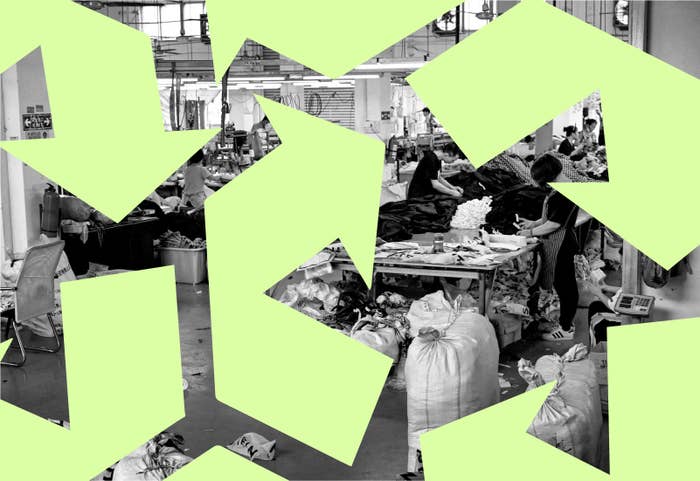
Environmental activists are calling bullshit on the fast fashion company Shein for launching a resale program to "address the ongoing issue of textile waste" on the same day a documentary about the fast-fashion company’s labor practices was released.
“The fact that they have chosen this week as the time to promote their new resale app feels audacious and utterly gross,” Venetia La Manna, an activist for better working conditions in fast-fashion production, who was featured in the documentary, told BuzzFeed News.
The notoriety of Shein has been well documented. Since its creation in 2008, the Chinese-owned e-commerce store has exploded in popularity, and its fast-rate production has made rivals unable to keep up.
Untold: Inside the Shein Machine, hosted by journalist Iman Amrani, featured footage from concealed cameras that were brought into two of Shein’s many factories in China, where workers were regularly working 16-hour days with quotas of 500 garments a day. The documentary highlighted the dismal labor practices and emphasized the brand’s negative environmental impact.
While the clothing retailer has steadily fed our appetite for super trendy, budget-friendly threads, the true cost of the fast-fashion giant has led activists to criticize its business model and call for change.
La Manna said that the resale initiative was nothing short of a greenwashing distraction, a way to appear to take environmental action but with little changes. “Those clothes are not built for the resale economy,” she said. “This clothing is made in such exploitative conditions that it is built to be worn once, maybe twice, before being thrown away.”
Analysis from Business of Fashion, a news outlet focused on the industry, found that over the past two years, nearly 100 brands have launched some version of a resale platform, designed to extend the lifespan of their clothing.
But according to activists, fast fashion is barely sturdy enough to wear once. So the suggestion that the clothing can have renewed purpose in someone else’s wardrobe is, quite simply, bullshit and doesn’t address the real issues of overproduction and overconsumption.
“They’re producing and making these clothes and then trying to offer some small solution to the much bigger problem that they’re creating. It’s greenwashing, making people think it's OK to buy this rubbish when it’s not,” Maria Chenoweth, CEO of Textile Reuse and International Development, a charity that aims to make the fashion industry more sustainable, said.
. @InStyle how can you pretend to care about the environment or labor issues when you support this? Shein is the worst of the worst disposable fashion companies. This is just depressing.
Shein has been labeled “the worst of the worst” by critics such as Maxine Bédat, the director of the New Standard Institute, an organization working to support sustainable fashion, but the brand says it’s committed to doing better.
In a statement to BuzzFeed News, a spokesperson said that the company was “extremely concerned” about the claims in the documentary, including that the people work up to 18 hours per day, and that it intended to investigate and sever ties with any of its suppliers that failed to meet its standards for responsible sourcing.
“We work with leading independent agencies like TUV, SGS, OpenView, and Intertek to conduct unannounced audits at supplier facilities. We have requested specific information from Channel 4 so that we can investigate,” the spokesperson said.
The company pitched its resale program as an opportunity to “better promote mindful consumption” and noted that it was just one of its various initiatives designed to put sustainability on the agenda.
“You can’t say that you're committed to solving a problem when you’re the person creating the problem,” Chenoweth argued.
Twitter users were also furious at the company. “The Shein resale news feels like another slap in the face for those of us who actually care about sustainable fashion,” one person tweeted.
y’all talk about shein shoppers like survivalists lost in the woods foraging for their next meals, they’re people with credit cards and internet shopping addiction, like, please…
“y’all talk about shein shoppers like survivalists lost in the woods foraging for their next meals, they’re people with credit cards and internet shopping addiction, like, please…” another person tweeted.
The brand, which boasts of its capacity to produce 1,000-plus new designs every day, feeds into overconsumption by pushing several microtrends simultaneously. While Shein’s defenders have championed its affordability, campaigners like La Manna and Franziska Trautmann, a climate activist from New Orleans, argue that not enough is being done to address our constant shopping habits.
“There isn’t enough messaging around not shopping. There’s just not enough people saying we need to stop consuming so much,” Trautmann told BuzzFeed News in a recent interview.
She said “encouraging people to just consume less” is key.
Similarly, La Manna believes that the cheap threads still come at a cost.
“We deserve so much more than exploitatively made clothing,” she said. “It's preventing us from developing our own sense of personal style, and I think it's also contributing to our mental health crisis.”
